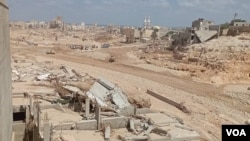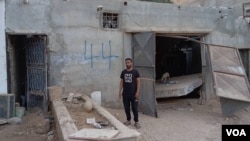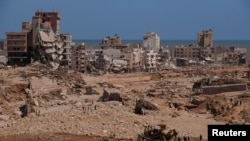In some places the water came on like a pack of cars, speeding more than 120 kilometers an hour over the tops of 30-meter-high palm trees.
As Hani Elbah, a 47-year-old government worker, saw the flood approach, he mentally prepared for death. It was September 11, the day Storm Daniel swept into his city, Derna, in eastern Libya.
A nearby building, seven stories high with 21 families inside, collapsed. "The families were all upstairs," recalls Elbah. "The flood crushed it like a milk carton."
Lights from mobile phones could be seen careening into the chaos as people were swallowed by the water. Elbah, his wife, and three children survived on the roof of a neighbor’s six-story building.
They were spared, but more than two months after the flood, authorities have counted nearly 4,400 dead and more than 8,000 people missing, according to the United Nations Office for the Coordination of Humanitarian Affairs.
And residents of Derna say the region is still reeling from trauma and lack of humanitarian aid to replace what they lost—which for many people was everything. More than 43,000 people are still displaced amid increasingly dire reports of suicides and other mental health crises.
"The city was worn out even before," says Elbah. "Now we need everything from A to Z. We need infrastructure, housing projects and water supply projects. Mostly we need psychological support."
Immediate needs
Some schools in Derna are operating a little, with damaged buildings and teachers missing or among the dead, adds Elbah, but others are destroyed or still occupied by homeless flood victims. Shallow mass graves appear in danger of being unearthed as workers continue to search for bodies.
On the streets of Derna, one only needs to look to the children to see the lingering trauma from the floods and what has become a widespread mental health crisis, says Sanad Alowami, a Red Crescent volunteer who works in Derna.
"Whenever they see rain, they will run to the rooftops and shout at people to come up, saying ‘It’s coming, it’s coming,’" Alowami says.
This mental health crisis is among Derna’s most urgent needs, says Talal Burnaz the Libya Country Director at International Medical Corps, but it is also a difficult issue to address. Libya lacks trained psychologists and a culture of mental health care, he says. But the trauma has become deadly, he says, with rising suicide rates and not nearly enough psycho-social support.
"We started seeing lots of reports about cases who committed suicide or tried to commit suicide in that region," he says. "And those people of course were… mentally affected by the loss of their family members. And that number is not… small."
People in areas destroyed by the floods also have immediate physical needs, adds Burnaz.
Roughly 2,000 families are still crowded into temporary shelters in Derna, like schools, relatives’ homes or abandoned dwellings previously considered unfit for habitation.
And in areas washed away by the floods, recovery has been slow, and sometimes haphazard, with aid suspended from time to time and other critical recovery projects still in the planning phase, says Alowami, from the Red Crescent.
As winter rapidly approaches, many families still need basic things, like warm blankets and sheets, he adds.
"At the beginning we received a lot of aid," he explains. "It was not all distributed correctly, but the demands were met. But for two weeks now most aid isn’t coming in."
Why the lack of aid?
In the days after the floods, people from all over Libya flocked to the ravaged region, working with aid groups, or just bringing what help they could from their homes and neighborhoods, according to Mary Fitzgerald, a Libya expert from the Middle East Institute, a Washington-based think tank. Libya’s two governments pledged their commitments to help the region recover.
But in the weeks that followed, many volunteers had to return to their families and jobs and the two governments’ moment of agreement did not blossom into a new era of joint efforts. Derna and the surrounding region remain isolated by political divisions, ravaged by years of war, easily ignored by the global community, and ripe for abuses and corruption, says Fitzgerald.
"The needs remain enormous," she explains, "but there is increasingly a sense that the authorities have essentially moved on."
In Derna, families are quick to say that help is needed, but they need it "direct to the people without any middle parties," without explaining the problem exactly.
Immediately after the floods, locals held protests, expressing anger over the corruption and mismanagement they believed lead to the collapse of the dams in the first place. But since then, international journalists and researchers have mostly not been allowed into the region and protests have stopped.
But the mental health crisis continues to deepen, according to Alowami, and many among the thousands of missing people are no closer to being identified. Bodies found now are as far away as 80 kilometers offshore.
"The people are still shocked from the catastrophe," he says. "People who lost their families and relatives didn’t cry for them. There wasn’t time to grieve."







